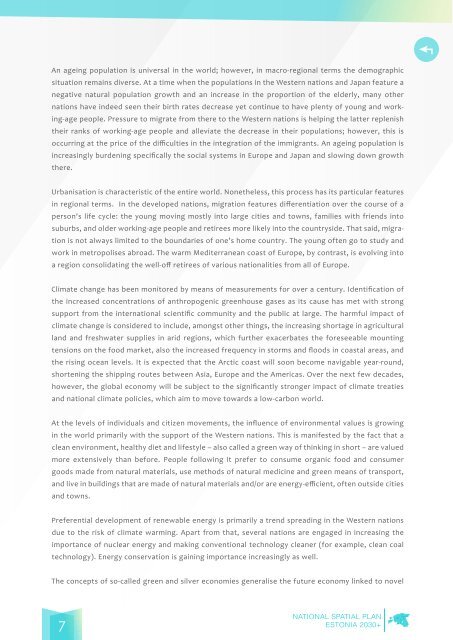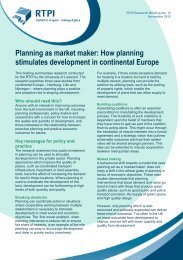estonia-2030_en
estonia-2030_en
estonia-2030_en
You also want an ePaper? Increase the reach of your titles
YUMPU automatically turns print PDFs into web optimized ePapers that Google loves.
An ageing population is universal in the world; however, in macro-regional terms the demographicsituation remains diverse. At a time wh<strong>en</strong> the populations in the Western nations and Japan feature anegative natural population growth and an increase in the proportion of the elderly, many othernations have indeed se<strong>en</strong> their birth rates decrease yet continue to have pl<strong>en</strong>ty of young and working-agepeople. Pressure to migrate from there to the Western nations is helping the latter repl<strong>en</strong>ishtheir ranks of working-age people and alleviate the decrease in their populations; however, this isoccurring at the price of the difficulties in the integration of the immigrants. An ageing population isincreasingly burd<strong>en</strong>ing specifically the social systems in Europe and Japan and slowing down growththere.Urbanisation is characteristic of the <strong>en</strong>tire world. Nonetheless, this process has its particular featuresin regional terms. In the developed nations, migration features differ<strong>en</strong>tiation over the course of aperson's life cycle: the young moving mostly into large cities and towns, families with fri<strong>en</strong>ds intosuburbs, and older working-age people and retirees more likely into the countryside. That said, migrationis not always limited to the boundaries of one’s home country. The young oft<strong>en</strong> go to study andwork in metropolises abroad. The warm Mediterranean coast of Europe, by contrast, is evolving intoa region consolidating the well-off retirees of various nationalities from all of Europe.Climate change has be<strong>en</strong> monitored by means of measurem<strong>en</strong>ts for over a c<strong>en</strong>tury. Id<strong>en</strong>tification ofthe increased conc<strong>en</strong>trations of anthropog<strong>en</strong>ic gre<strong>en</strong>house gases as its cause has met with strongsupport from the international sci<strong>en</strong>tific community and the public at large. The harmful impact ofclimate change is considered to include, amongst other things, the increasing shortage in agriculturalland and freshwater supplies in arid regions, which further exacerbates the foreseeable mountingt<strong>en</strong>sions on the food market, also the increased frequ<strong>en</strong>cy in storms and floods in coastal areas, andthe rising ocean levels. It is expected that the Arctic coast will soon become navigable year-round,short<strong>en</strong>ing the shipping routes betwe<strong>en</strong> Asia, Europe and the Americas. Over the next few decades,however, the global economy will be subject to the significantly stronger impact of climate treatiesand national climate policies, which aim to move towards a low-carbon world.At the levels of individuals and citiz<strong>en</strong> movem<strong>en</strong>ts, the influ<strong>en</strong>ce of <strong>en</strong>vironm<strong>en</strong>tal values is growingin the world primarily with the support of the Western nations. This is manifested by the fact that aclean <strong>en</strong>vironm<strong>en</strong>t, healthy diet and lifestyle – also called a gre<strong>en</strong> way of thinking in short – are valuedmore ext<strong>en</strong>sively than before. People following it prefer to consume organic food and consumergoods made from natural materials, use methods of natural medicine and gre<strong>en</strong> means of transport,and live in buildings that are made of natural materials and/or are <strong>en</strong>ergy-effici<strong>en</strong>t, oft<strong>en</strong> outside citiesand towns.Prefer<strong>en</strong>tial developm<strong>en</strong>t of r<strong>en</strong>ewable <strong>en</strong>ergy is primarily a tr<strong>en</strong>d spreading in the Western nationsdue to the risk of climate warming. Apart from that, several nations are <strong>en</strong>gaged in increasing theimportance of nuclear <strong>en</strong>ergy and making conv<strong>en</strong>tional technology cleaner (for example, clean coaltechnology). Energy conservation is gaining importance increasingly as well.The concepts of so-called gre<strong>en</strong> and silver economies g<strong>en</strong>eralise the future economy linked to novel7




